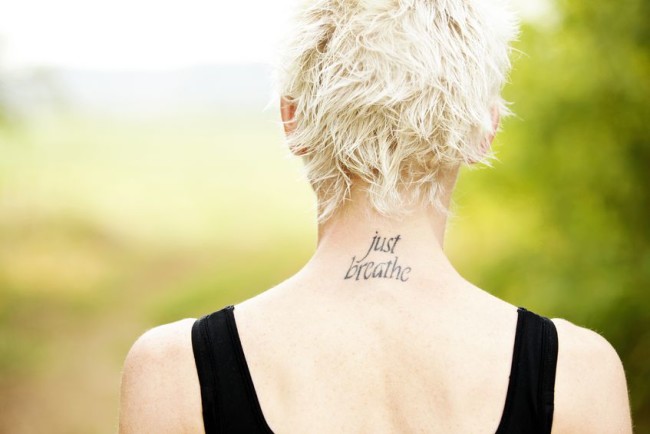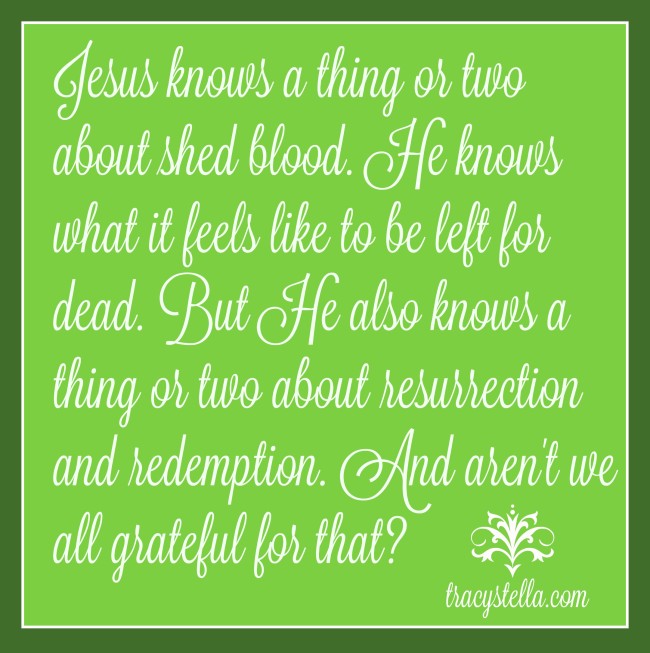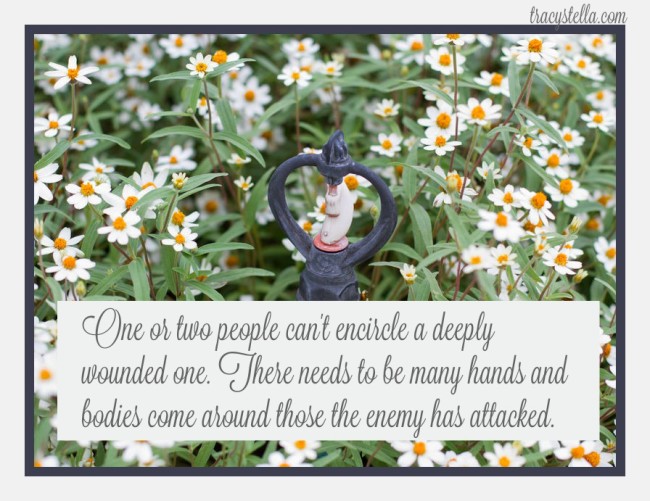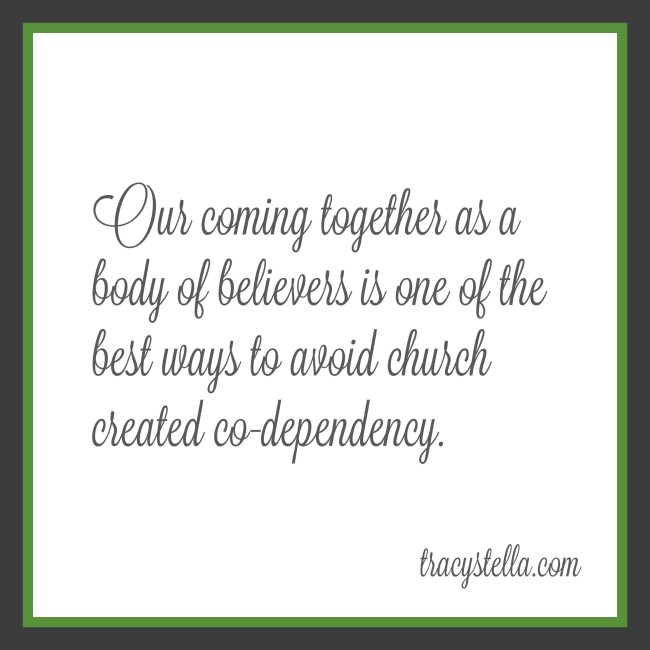Some of God’s reminders stand out more than others, don’t you think? He’ll let us get to the end of our rope, and then He’ll draw us back into His presence and His perfect peace.
We sigh a sigh of relief and think, “Thank You, Jesus, for not letting us wander too far from the path You planned for us. Thank You for drawing us near. Thank You for carrying burdens too heavy for us to lift.”
Before He brought me back to a place of peace I felt overwhelmed, even as I tried to pull myself together. My emotions tied up in knots over a difficult situation that indirectly touches my life. I care about those involved. I’ve grown to love them. It’s not “my problem” per se, but it is heart wrenching to watch.
When someone we care for walks through a fiery trial, it can make us feel like a helpless bystander at the scene of an automobile crash when we have no medical expertise to resuscitate the victim in need of life-giving breath. Thoughts roil as she lies on the side of the road bleeding out. I wonder about her fate. I hope she will be healed once and for all from the inside out.
In this post we will learn what CPR means to a Christian and how that awareness impacts our behavior.
 We may need to help bandage wounds, but God is the Healer. He sees and knows the cause of every deep pain and how those gashes got there in the first place. Because God knows the root, He knows just where to touch in order to heal.
We may need to help bandage wounds, but God is the Healer. He sees and knows the cause of every deep pain and how those gashes got there in the first place. Because God knows the root, He knows just where to touch in order to heal.
The situation reminds me of the parable of the Good Samaritan. I encourage you to go read it in the Gospel of Luke 10:25-37. The premise is the religious people of the day saw a man who had been attacked, stripped, and left for dead (v30). The religious people saw him and crossed to the other side of the road. They were too busy to help. This job would require their hands to get dirty, helping the victim covered in blood from such a violent attack.
Think about how the enemy, Satan, violently attacks his victims. He is called a lion for good reason. He lies in hiding, waiting to pounce on prey isolated from the pack of believers. Maybe his prey the wobbly baby believers just learning to walk and in need of protection. Maybe might mean yes. Certainly, God’s protection required. But how might He use us to help with that?
There are people who drive by accident scenes gawking. They lean their heads out the window, curious to see what’s happening. They have no intention of helping. Their actions back up traffic, but don’t bring aid. In fact, they may delay real help being able to gain access to the victims.
Many of you do help, and that is beautiful to witness. You’re not drive-by Christians who look the other way after your curiosity is satisfied. Thank you for being God’s love in the flesh to those who need it most. I pray you are encouraged seeing good fruit from all aid God delivers through your hands.
While there are some who don’t stop at the scene to help, there are often heroes who step in and step up to bring the love of God in tangible ways to those we’ve grown to love as we’ve walked with them. In those moments, we thank God He has sent help through other human hands who know and love Him. We thank God when we see the body of believers coming together, encircling the wounded ones, and protecting them from any more of the lion’s violent attacks. No more! Jesus intervenes because He loves. He loves enough to die for us, so we can bank on the fact that He will stir His body into action and help the ones bleeding by the side of the road. Jesus knows a thing or two about blood. He knows what it feels like to be left for dead. But He also knows a thing or two about resurrection and redemption. And aren’t we all grateful for that?
 You see, one or two people can’t encircle a deeply wounded one. There need to be many hands and bodies come around those the enemy has violently ripped apart. His teeth are sharp and often bite into many generations of a family line. In order for all the wounds to heal and the bleeding out to stop, a medical team is needed. Otherwise, all it is triage —one emergency after another without any real healing taking place. We all have unique gifts and abilities that God chooses to use collectively to help His children. I believe that is God’s design so the wounded ones don’t view anyone other than God Himself as Savior. It’s not about any one of us; it’s about what God does in and through us.
You see, one or two people can’t encircle a deeply wounded one. There need to be many hands and bodies come around those the enemy has violently ripped apart. His teeth are sharp and often bite into many generations of a family line. In order for all the wounds to heal and the bleeding out to stop, a medical team is needed. Otherwise, all it is triage —one emergency after another without any real healing taking place. We all have unique gifts and abilities that God chooses to use collectively to help His children. I believe that is God’s design so the wounded ones don’t view anyone other than God Himself as Savior. It’s not about any one of us; it’s about what God does in and through us.
 When the body does God’s work together, there’s less opportunity for wounded ones to mistake who is their Savior.
When the body does God’s work together, there’s less opportunity for wounded ones to mistake who is their Savior.
I’ve definitely desired a medical team to help in the disciple-making process in this situation. I knew I was in way over my head. I’ve prayed for a medical team. I’ve plead for it. I’ve sought help. I know in this, God has prepared me. He’s helped me see things—great need and the effectiveness of many hands to do the heavy lifting—and I do believe that insight is going to play a significant role in what God calls me to do in the future.
But here’s the thing. It is hard. This walking with others is unbelievably difficult at times.
When we allow ourselves to be vulnerable enough to engage in other people’s real life –the messy stuff—we expose ourselves to feel things we’d rather not.
I’m not sorry I’ve exposed myself to emotions of grief and sadness even though I don’t want to feel those feelings. What’s the alternative? To not care? I can’t do that – at least not anymore. Not as a believer. We’re called to care.
Discipleship is messy, but that doesn’t mean we shouldn’t do it.
 Jesus dying on the cross for us was hard, but He did it anyway. Because He loves us and He wanted to show us what sacrifice looks like (among other things).
Jesus dying on the cross for us was hard, but He did it anyway. Because He loves us and He wanted to show us what sacrifice looks like (among other things).
Sometimes, God calls us to sit in the dirt with someone as we grieve with and for them. An example in Scripture of how to do this is left for us in the book of Ezra. Ezra assumed the guilt of the Israelites. He didn’t separate Himself from their sin (but he didn’t join their sin either). He grieved for Israel and their situation. He fasted. He cried out to God on their behalf. He led them. He challenged them. He reminded them of what God’s Word says. He worked diligently for the Lord and Ezra called others to do the same. Ezra was given wisdom from God for the good of God’s people.
God pointed me to the book of Ezra to help me help others as I learn from how Ezra participated in God’s plan. I encourage you to read the book of Ezra from the vantage point of what we can learn about discipleship.
At the evening sacrifice I arose from my fasting; and having torn my garment and my robe, I fell on my knees and spread out my hands to the LORD my God. And I said: “O my God, I am too ashamed and humiliated to lift up my face to You, my God, for our iniquities have risen higher than our heads, and our guilt has grown up to the heavens.”—Ezra 9:5-6 NKJV
As I mentioned earlier, Ezra didn’t distance himself from Israel’s sin. See how often he used the pronoun “our”? He stood in the gap for Israel. He fasted. He prayed. And he called the iniquities his own.
I wonder. In this situation I have been walking through, I wonder. I wonder if I should have done more. I wonder if God wanted me to love differently—perhaps tougher. I don’t know. These are questions I put before the Lord as I search my heart. I wonder if there were things I missed along the way. I’m sure there were. But. I did the best I knew how to do. God’s grace covers the rest.
I am reminded. All of this is God’s job. Not mine. I do have a role to play. We all do. Our job is to continue listening to God’s voice, His leading, and His guiding. God is the great Physician. We are His Physician’s Assistants. That is all.
In all of this there is a fine line, one I’m still figuring out and probably will be for a long time—at least rebalancing and coming back to Christ to check in on this issue. Like I mentioned earlier, discipleship is messy. There’s a level of taking responsibility and doing what we feel God calling us to do, and there’s a level of taking too much responsibility. That’s called co-dependency and that is not healthy. God has helped me greatly in this area, and I’ll continue to smash my face up against His, because I need to be that close in order not to carry too much weight. I also need to be that close so as not to shy away either, because it can be scary seeing need square in the face. I wonder how many of you can relate to either of those sentiments. I’d love to know your thoughts on this topic.
In the discipleship process I do know God wants us all to carry our fair share.
And some men were carrying on a bed a man who was paralyzed, and they were trying to bring him in and to set him down in front of Him (Jesus). But not finding any way to bring him in because of the crowd, they went up on the roof and let him down through the tiles with his stretcher, into the middle of the crowd, in front of Jesus. Seeing their faith, He said, “Friend, your sins are forgiven you.”—Luke 5:18-20 NASB (Added for clarification)
Because discipleship can be hard, we need help.
If we each pick up a corner of the gurney, we can transport the victim directly to the healing source—Jesus—just as the paralytic’s friends did. They did everything they could to bring their friend before Jesus, so He could heal what they could not. Only God can forgive sin, and when a sinner (and that is all of us) is called Friend by Jesus … that’s the start of significant change in a person’s life. I pray that is so for all whom we are walking with, that they meet Jesus and their lives are changed by Him because of Him.
When we fully grasp our sinful state and come to Jesus, our healing begins. Otherwise, we’re sitting in a puddle of pride thinking we don’t need anyone’s help – least of all Jesus or His hands and feet, the Church.
It is imperative we come together as a body of believers. God has burdened my heart on the topic of church and created co-dependency. We don’t want that. More importantly, He doesn’t want that. Our coming together as a body of believers is one of the best ways to avoid church created co-dependency. When we come together, there is wisdom in much counsel. Many of you possess a deep level of wanting to help others. You’re hard-wired to be God’s hands and feet. Remember, though, many hands make that happen in the most effective way.
 I pray each of our hands helps with the heavy lifting so often needed as God pulls people from a pit. Remember, you have an important, equal part to play in God’s purposes. If you are a believer, you can bet He wants you to help. You ARE His plan. You are not all of it, but you play a role. He saved you so that others could see Him in you. How else will they meet Jesus if we’re all sitting on our hands? Another question to consider… Who’s carrying extra weight that wouldn’t be if we helped? If we don’t do our part, someone’s carrying the responsibility God has assigned to us. Not sure? Ask Him. The end game is too important not to.
I pray each of our hands helps with the heavy lifting so often needed as God pulls people from a pit. Remember, you have an important, equal part to play in God’s purposes. If you are a believer, you can bet He wants you to help. You ARE His plan. You are not all of it, but you play a role. He saved you so that others could see Him in you. How else will they meet Jesus if we’re all sitting on our hands? Another question to consider… Who’s carrying extra weight that wouldn’t be if we helped? If we don’t do our part, someone’s carrying the responsibility God has assigned to us. Not sure? Ask Him. The end game is too important not to.
And now for a little while grace has been shown from the LORD our God, to leave us a remnant to escape, and to give us a peg in His holy place, that our God may enlighten our eyes and give us a measure of revival in our bondage.—Ezra 9:8 NKJV (emphasis mine)
Here’s what Dr. David Jeremiah states about what the peg represents:
…stability and a sense of place. Because God had brought the Israelite remnant back to Jerusalem and given them favor, the Jews now had some stability and permanence. They were safely under God’s care, planted once more in the land He had promised them. This metaphor has significance for us too. Like pegs in the holy place, we are people with a permanent place in God’s presence. We are securely installed in His house and charged with an important purpose there: to be “as living stones” who are being built into “a spiritual house, a holy priesthood, to offer up spiritual sacrifices acceptable to God through Jesus Christ” (1 Peter 2:5).¹
Stability and permanence happen best when all the body of believers is involved. If there’s a crack in the foundation, the house can crumble. When we all come together for kingdom purposes, God’s glory is revealed. There is no misplaced Savior complex, and inadvertent created codependency within the Church is a thing of the past.
Does it require sacrifice? Yes, it does. But what does God’s Word say in 1 Peter 2:5? We are to offer up spiritual sacrifices acceptable to God through Jesus Christ.
What does CPR mean to a Christian? When we were bleeding out on the side of the road in need of His help, Jesus was there. Christ Paid the Ransom. As a sinner saved by grace, we all qualify as someone who was formerly bleeding out by the side of the road in need of CPR. He saved us through His shed blood. Whatever sacrifice Jesus asks us to make could never measure up to the one He already paid for us.
QUESTIONS & ACTIONS
My prayer is the Holy Spirit reveals answers to the questions below that will positively impact your life and the overall health and vitality of His Church. I also pray He aligns you with His will for what role He desires you to take in making healthy disciples. In Jesus’ name, amen.
- What spiritual sacrifice is God calling you to make for others through Jesus Christ?
- What stops you from doing so? How can you overcome what gets in the way?
- How is God asking you to participate (or participate in a greater way) in building His spiritual house?
- Have you ever thought of the Church and inadvertent created co-dependency?
- What role would God want you to take to reduce the possibility of created co-dependency in the Church?
About the author: Tracy Stella is a Christ-follower on the journey of life, seeking to see God and His will for her fulfilled on this great adventure. She feels compelled to share the story of God’s hand in her life with the hope that readers will search for and see God at work in their own lives. Jesus writes the greatest story of all. It’s called Redemption for those who are willing to surrender to His love and leading. I pray God continues to write a glorious story in each of your lives. Amen.
If you found this helpful or inspiring (or maybe a little challenging), consider sharing it with others. Thank you for reading and God bless!
¹Jeremiah, David. The Jeremiah Study Bible. New King James Version. ed. Brentwood, Tenn.: Worthy Publishing, 2013. 616.